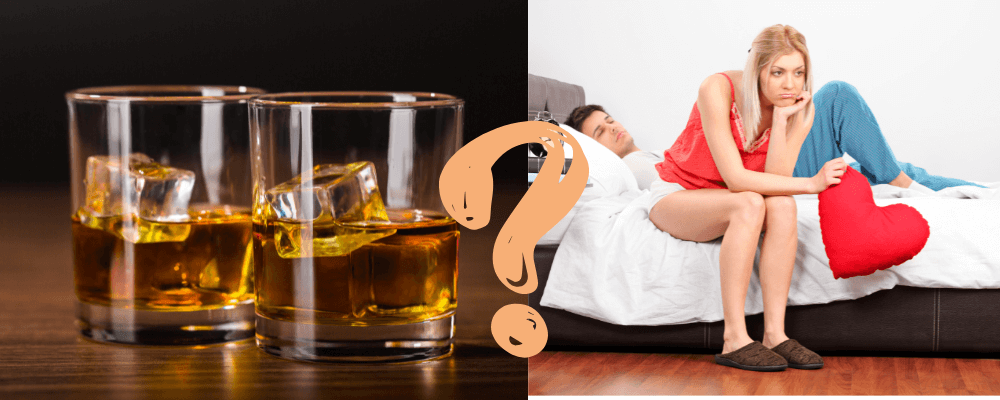Alcohol and Erectile Dysfunction: Understanding the Connection

Alcohol is often enjoyed in social settings, known for boosting relaxation and confidence. However, excessive consumption can have serious consequences on sexual health.
High alcohol intake disrupts the autonomic nervous system, reducing blood flow towards the penis and affecting nerve signals. Over time, this can lead to persistent sexual issues such as erectile dysfunction or ED.
Understanding this connection between alcohol and erectile dysfunction is crucial to making informed decisions about alcohol intake, preserving sexual health, and promoting overall well-being.
What is Erectile Dysfunction?
Erectile dysfunction, or ED, is one of the most common sexual disorders that men experience in their lifetime. It is reported that ED impacts up to 150 million men worldwide. This problem is associated with the inability to obtain and hold an erection that is long and firm enough for intercourse.
It occurs due to the following reasons:
Most often, it happens when blood flow to the penis is restricted.
There is excessive pressure or emotional upheaval.
Nerves are harmed during intercourse.
As an early indication of a more severe issue, such as high blood pressure, heart disease, atherosclerosis (hardening or blocked arteries), or high blood sugar from diabetes.
Identifying the root causes of erectile dysfunction is key to effective treatment, allowing for timely intervention and improved sexual health and overall well-being.
It is reported that addressing lifestyle factors, including alcohol consumption, ensures effective ED treatment. Excessive amounts of alcohol can affect significant areas of your body and contribute to ED development.
Keep on reading as we uncover the connection between alcohol and erectile dysfunction.
Regular Alcohol Consumption and ED: What is the Connection
According to a recent study, experts found a significant relationship between the consumption of alcohol and erectile dysfunction. Let us disclose it:
Damaging the Nervous System
Heavy alcohol consumers experience autonomic nervous system disorder. Due to this, getting and keeping an erection during a sexual relationship with a partner can become challenging.
Arising Cardiovascular Disease
Light to moderate drinking creates the risk of cardiovascular disease at a lower level. Heavy consumption is a reason behind increased cardiovascular mortality.
Blood Vessel Damage
People with heavy alcohol consumption habits have the potential to develop high blood pressure, a risk factor for sexual dysfunction.
Can Alcohol-Related Erectile Dysfunction Be Prevented?
Erectile dysfunction due to alcohol consumption can be prevented by understanding the connection between alcohol and ED and then adopting strategies accordingly. Here are some approaches you can take to manage ED development.
Consume Alcohol in Moderation
If you choose to drink, do so in moderation. For men, this typically means no more than two drinks per day. Limiting alcohol intake can help prevent its adverse effects on sexual health.
Adopt a Healthy Lifestyle
Incorporate some good habits into your daily life to increase your overall well-being, which ultimately contributes to better sexual health. Consider adopting habits such as eating a nutritious diet, exercising for at least 30 minutes daily, managing stress and emotions effectively, and getting adequate sleep.
Consider Medications
In some cases, you may have to take medications to address alcohol erectile dysfunction. Partner with an expert to find the most suitable treatment options for you. Always consult a trusted medical professional to manage the development of ED in your body.
The Types of Erectile Dysfunction
Certified professionals separate ED into four categories:
Neurogenic ED
Neurogenic erectile dysfunction is a result of nerve issues. When alcohol consumption interferes with the process of sending signals from your brain to your penis, it can contribute to this condition. Other reasons that can cause neurogenic ED are trauma, radiation therapy, pelvic surgery, stroke, spinal stenosis, and multiple sclerosis.
Vascular ED
Vascular erectile dysfunction happens when the blood vessels fail to supply adequate blood to the tissues in the penis, a condition that can occur due to excessive alcohol consumption. As per reports, vascular ED is the most common type in men.
Hormonal ED
Hormonal erectile dysfunction is a result of testosterone deficiency in males, or, in some cases, a consequence of thyroid issues. It was revealed that the drinker groups who consumed more than 112 g of alcohol every week had a 4.37 times higher risk of this deficiency than the nondrinker group.
Psychogenic ED
Psychogenic erectile dysfunction happens when someone experiences psychological disorders (conditions that affect their emotions, thoughts, feelings, or behaviour).
Usual Age for Erectile Dysfunction
Scientists and medical researchers estimate that ED affects over 50% of males between the ages of 40 and 70. It is the most common sex-related issue in men worldwide. However, many individuals do not seek medical attention for the condition due to embarrassment or shame.
How to Treat Erectile Dysfunction?
Regardless of the cause, ED can be treated successfully. Here are three ways:
Self-care and Prevention
Practising self-care can help prevent or manage erectile dysfunction. Limit alcohol and drug use, quit smoking, and maintain healthy blood sugar levels to protect nerve function and blood flow. Managing stress and depression through exercise, mindfulness, or professional support also supports sexual health.
Also, understanding the correlation between alcohol and erectile dysfunction is essential. These insights help individuals make informed decisions about their alcohol consumption and take proactive steps to maintain a healthy sex life.
Not only alcohol, drugs, cigarettes, and other tobacco products damage nerves and blood vessels, leading to decreased blood flow to the penis. In addition, hormonal imbalance due to anxiety, fatigue, or depression is another significant cause behind the inability to achieve an erection.
Medical Treatments
Opt for medical treatments to control ED severity under the supervision of trusted healthcare professionals. Take medicines like Avana Avanafil 100mg Tablets, Cenforce FM Sildenafil Citrate 100mg Tablets, Cialis Tadalafil 10mg Tablets, or Viagra 100mg Tablets only after being prescribed by your doctor.
Remember, ED medications can interact with drugs for heart disease, HIV/AIDS, fungal infections, prostate issues, and more. To stay safe, inform your doctor about all prescription and non-prescription medications, herbs, and supplements you are taking.
Besides, there are some less invasive treatment,s including hormone therapy, self-administered intraurethral therapy, self-injection therapy, and vacuum therapy. Be aware of the potential benefits and side effects of each option before choosing the right one.
Surgical treatments
These are appropriate when the ED occurs due to nerve or blood vessel damage after pelvic or spinal cord injury. It is also the best option for those who have tried medical treatments but have not been successful. Surgical therapies include arterial surgery and penile implants.
Men may consider arterial surgery if ED is caused by damaged arteries that supply blood to the penis. Another option is a penile implant, which allows for an erection on demand and has high patient satisfaction rates, especially when natural erections are no longer possible.
The Bottom Line
Occasional alcohol intake may not produce long-term effects, but chronic alcohol use disrupts your sexual life, making erections difficult to achieve. Recognizing the link between alcohol and erectile dysfunction is necessary for those struggling with ED.
If you suspect that alcohol is the reason behind erectile dysfunction, seek help from professionals and develop a personalized treatment plan. Remember, do not self-medicate and always seek advice from a licensed healthcare professional before taking any pills.
Never compromise on quality when managing erectile dysfunction. Choose trusted sources like Indogenmed for doctor-approved ED medications delivered to your door. Order with confidence today!
Frequently Asked Questions
Will my erectile dysfunction go away if I stop drinking alcohol?
Yes, there is a high chance of controlling ED if you stop consuming alcohol. Also, quitting alcohol ensures satisfying sexual relationships and overall well-being.
How to treat ED naturally?
To naturally reverse ED, you need to understand the root causes first. Then, take up self-care approaches like drinking alcohol in moderation, adopting a healthy lifestyle, controlling your blood sugar level, handling stress, and saying no to tobacco.
Additionally, cardiovascular exercise for at least 20 minutes per day also helps reverse mild ED.
Can erectile dysfunction be cured?
Yes, you can cure ED by reducing alcohol intake, leading a healthy lifestyle, and seeking help from a certified healthcare provider. A doctor can help identify the underlying causes, understand the association between alcohol and sex, recommend customized treatments, and provide guidance on recovery strategies.
Can alcohol-induced erectile dysfunction be reversed?
In many cases, alcohol erectile dysfunction is reversible. In general, the symptoms start to disappear after quitting alcohol, but the time interval varies significantly, based on the patient's current health condition, lifestyle, and more.
How do you fix alcohol-induced erectile dysfunction?
Alcohol-induced ED can be managed through three main approaches: self-care and prevention, medical treatments, and surgical procedures. Consult a certified healthcare provider to determine the best course of action for your specific needs.
Can Viagra cure erectile dysfunction?
Yes, Viagra, Cialis, and Levitra are approved to treat ED in men aged 18 years and older. Sildenafil (Viagra) works quickly on patients but lasts only for a few hours, while Tadalafil (Cialis) lasts up to 36 hours.
Can you take Viagra with Cialis?
No, you cannot take Viagra with Cialis together, as combining them without medical supervision can cause severe side effects.
Is Cialis the best ED drug?
It is difficult to say that Cialis is the best ED drug. The best pill to treat ED largely depends on the patient's health condition. Most often, people prefer Cialis for its long-lasting effects. However, Stendra and Viagra are also popular for their minimal side effects and effective results.
Can erectile dysfunction be cured without medication?
Yes, heavy alcohol consumers experiencing ED can overcome this issue without medication. By understanding the link between alcohol and sex and adopting self-care strategies, they can effectively restore erectile function and improve overall well-being.
Can sildenafil cure erectile dysfunction?
Yes, Sildenafil is a common medication when it comes to curing ED. It belongs to the Phosphodiesterase type 5 (PDE5) inhibitor class of drugs, which helps to boost blood circulation by relaxing blood vessels.
Disclaimer: Please share your medical history and current medications with your doctor before starting ED treatment. Buy only when the pills are prescribed, and go to a certified doctor if you observe any adverse effects.
References:
https://www.healthline.com/health/alcohol-and-erectile-dysfunction#summary
https://www.urologyhealth.org/urology-a-z/e/erectile-dysfunction-(ed)
https://my.clevelandclinic.org/health/diseases/10035-erectile-dysfunction


